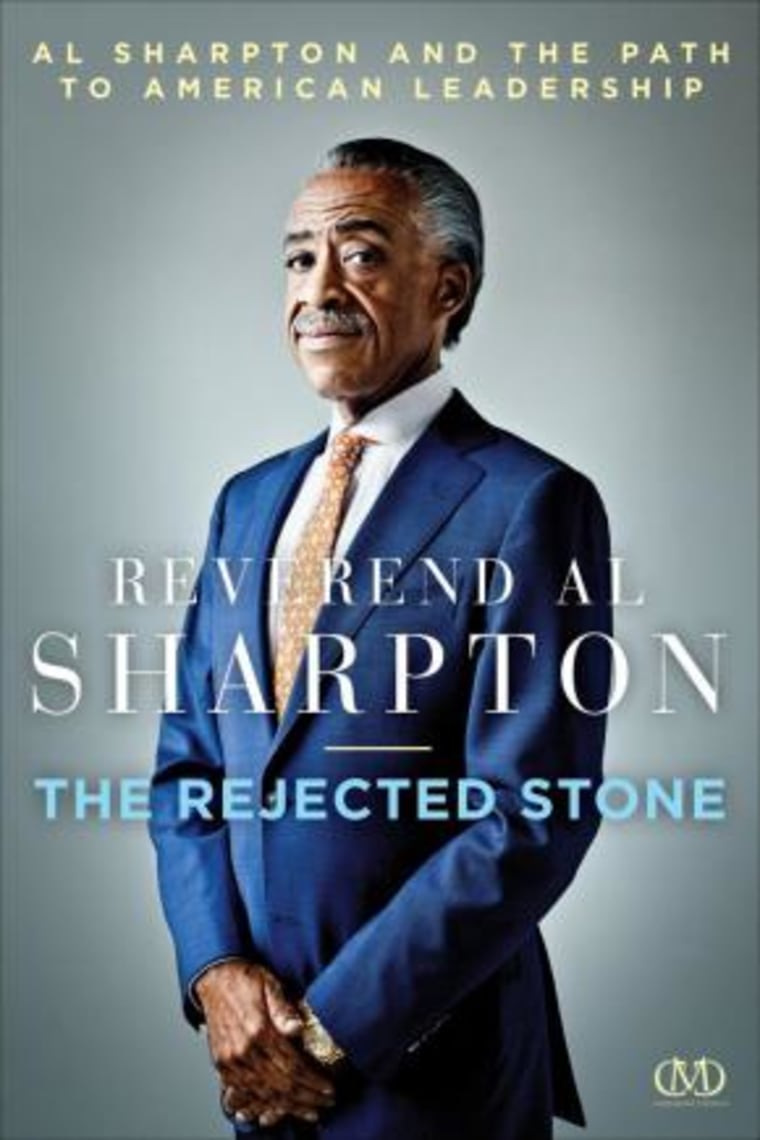In "The Rejected Stone," activist and civil rights icon Reverend Al Sharpton takes a look back at his storied trajectory from street activist to political pundit and recounts what he's learned. Here's an excerpt.
When we walked down those final steps in the chute and then stepped out onto the open stage, we appeared on the big screen. I could hear applause. As I looked out among the throng and heard the clapping, I imagined it was coming from the folks who knew how unlikely it was to see me up there, with my James Brown hairdo. One hundred forty pounds lighter. The medallion I used to wear long gone. As were the sweat suits that used to be my uniform, worn in the style of my contemporaries such as Run-D.M.C.
Now I had on a tailored suit. I had on a tie. But I was still Reverend Al from Brownsville. I was there representing all the unlikelies out there. I was there for the rejects. I was there for the people who others thought would never amount to anything.
But I went to that inauguration stage on my own terms. I never sold out my principles. I never backed down from what I believed. I never apologized for standing up. I never regretted going to jail and marching. It is one thing to beat the odds and achieve something as you transform, but it’s another thing not to have to do it at the expense of your own soul. Because you can grow, but you don’t have to break. You can have the courage to change without having to compromise your basic integrity.
Listen to Rev. Al Sharpton read an excerpt from the audiobook of 'The Rejected Stone'
As I walked down those steps and took my seat, picking up the blue blanket that said “Honored guest of the President of the United States,” I knew that everybody watching at home—and those who were not watching—has an opportunity to transform as I did. To transform as American society has transformed. Because underlying my reflections about the distance of my own journey was the knowledge that American society had also undergone a startling transformation over those years. This was reflected most of all in the basic reason for my presence on that stage: A black man, a friend of mine, was being sworn in as president of the United States. And a Puerto Rican woman was swearing in the vice president. Neither one of those facts would have been possible in the early days of my career. As America changed, grew more tolerant and more accepting, it allowed people like me to change my tactics. I no longer had to be as confrontational to get an audience. I no longer had to be as radical to make the authorities pay attention. The country grew and, in the process, allowed me to grow.

As I prepared to take my seat, I felt someone tap me on the shoulder. I turned around and was greeted by Jay-Z and Beyoncé. They were there because Beyoncé was to sing the national anthem. Jay-Z came from the same streets of Brooklyn that I did. This guy who had hustled on the streets, selling dope—how unlikely was it for him to be on that stage? But there he was, a music mogul, a multimillionaire, a cultural trendsetter. He and I, two kids from Brooklyn, a half-generation apart, sitting on that platform together, the ultimate examples of the fact that any of us can truly be what we want if we’re not afraid to grow into our ultimate destiny.
After I sat down, I looked across the aisle at Clarence Thomas. He stood for everything I despised, but he was sitting there in the black robe of the Supreme Court, a black boy born and raised in the segregationist South. How unlikely was it that this man, who grew up as a hated target of Jim Crow’s wrath, would don that black robe?
I sat on the platform among people who represented American power, but all of them were unlikely in their own way, from Vice President Joe Biden to House Speaker John Boehner, from Michelle Obama to Supreme Court Justice Sonia Sotomayor. But while I didn’t know all the details of their stories, their paths, I knew my own. And I knew there were many people who would find my presence on that stage unbelievable. But I didn’t. All that I was I always believed I would be. I believed what the Bible said, that the rejected stones would become the cornerstones of a new world order. Race and class and gender bias and homophobia were all on their deathbed, on the verge of being swept into the dustbins of history.
As Barack Hussein Obama, the forty-fourth president of the United States, put his hand on that Bible, I put my hand on my mental Bible. While he took his oath of office, I took my own special oath. My oath said that as the world continues to change, we all must remember that, as Gandhi said, change starts by changing yourself. And I will be committed throughout the rest of my life to spreading change, fighting for transformation, battling for the rejected stones, trying with all my might to remain a walking billboard with a simple message: Never let your environment and your circumstances limit your possibilities.
Excerpted from THE REJECTED STONE by Reverend Al Sharpton. Copyright © 2013 by Reverend Al Sharpton. Excerpted by permission of Cash Money Content. All rights reserved. No part of this excerpt may be reproduced or reprinted without permission in writing from the publisher.